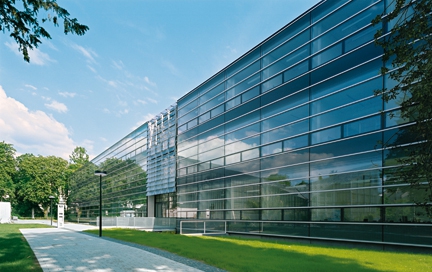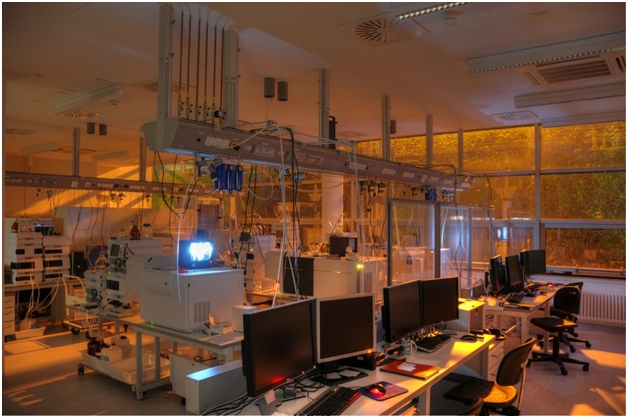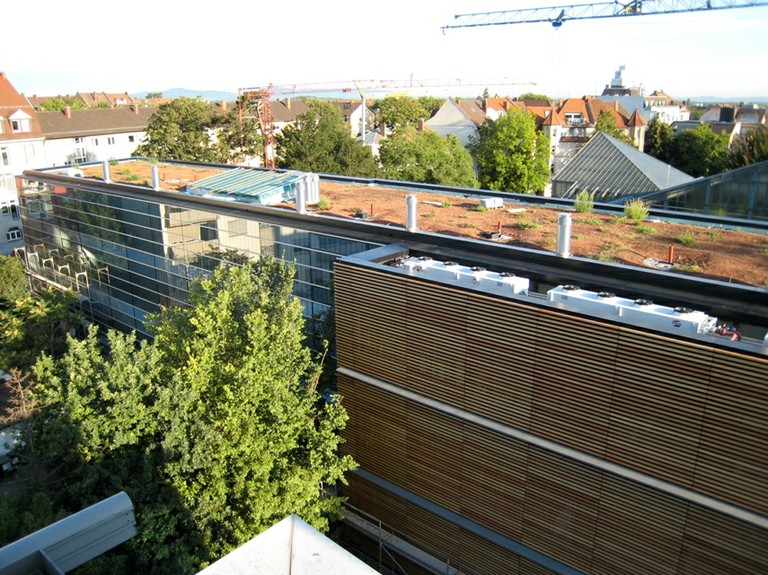

ZBSA Zentrum für Biosystemanalyse

2001 | August: The University of Freiburg submits an application for a new life sciences research center concept in the context of a state-wide competition. A team of scientists from all Freiburg file sciences faculties, coordinated by W. Driever, developed a concept for a center which brings together state-of-the-art data acquisition and systems biology modelling expertise, “Zentrum für Biosystemanalyse – ZBSA”.
2002 | January: The government of Baden-Württemberg announces the results of a state-wide and peer-reviewed competition for life sciences centres. 20 Mio Euro are awarded to the University of Freiburg for a research building to house the ZBSA.
2002–2005: Coordination of the foundation phase of the ZBSA by W. Driever. Architectural competition for the ZBSA building. The winning concept for the building is developed by the architects Hascher and Jehle with the goal to connect experimental laboratories and technology facilities with office areas for computational biology and mathematical modelling through extensive common communication areas. Detailed planning of the research building and start of construction.
2004 | November: The state government of Baden-Württemberg (MWK) approves a concept for operation of the ZBSA, which includes the dedication of three professorships into the ZBSA: Systems Biology & Modelling (J. Timmer - Faculty of Physics and Mathematics, 2005); Bioinformatics & Molecular Biology (R. Baumeister – Faculty of Biology, 2003); Bioinformatics (R. Backofen – Faculty of Engineering and Informatics, 2005) as well as four scientific heads of the core competence laboratories in genomics, proteomics, metabolomics, and imaging.

2005 | July: Foundation of the ZBSA as an interdisciplinary research center at the University of Freiburg following approval of the bylaws of the ZBSA by the Senat of the University. R. Baumeister is appointed the first executive director of the ZBSA together with a board of five directors.
2005 | October: Laying of the foundation stone of the new ZBSA building.
2005 | November: Foundation symposium and official opening of the ZBSA as an interdisciplinary research center at the University of Freiburg, which remains a virtual center during the construction phase of the building.
2007 | January: The BMBF decides to fund as part of its FORSYS initiative the Freiburg initiative for Systems Biology FRISYS (coordinated by W. Hess) for five years with a total of 13.2 Mio Euro. FRISYS establishes several professorships and research groups in the ZBSA: A. Becker (systems biology of regulatory networks in prokaryotes; Faculty of Biology 2008), D. Lebiedz (Modeling and Scientific Computing; ZBSA 2008); P. Pfaffelhuber (stochastic modelling; Faculty of Mathematics and Physics 2008); M. Simons (medical systems biology; Faculty of Medicine 2009)
2007 | October: The DFG and Wissenschaftsrat award the Excellence Research Cluster “BIOSS” to the University. BIOSS establishes research groups in the field of signalling research in the ZBSA. The University of Freiburg is also awarded excellence status for its institutional concept including the Freiburg Institute for Advanced Studies FRIAS school LIFENET, focussing on analysis of complex properties of biological systems. The FRIAS research groups of J. Dengjel (protein dynamics, 2008) and H. Busch (cell control and communication 2008) are established at the ZBSA.
2008 | April: Completion of construction of the ZBSA center building and start of operation of core competence laboratories in genomics (T. Kurz), proteomics (A. Schlosser), metabolomics (A. Gessler), and life cell imaging (R. Nitschke).
2008 | October: The University of Freiburg implements a new Master of Science program in “Bioinformatics and Systems Biology” (coordinator: R. Backofen) of the Faculties of Engineering and of Biology.
2009 | June: Official opening symposium of the ZBSA research center building.

2010 | July: The Rektor of the University appoints W. Driever as executive director of the ZBSA.
2011 | May: First external scientific review of the ZBSA by the SAB. From the summary statement: “The ZBSA has done an excellent job and should be seen as a crucial ingredient in any attempt to develop internationally-leading life sciences at Freiburg. The leadership is excellent and the Centre has been outstandingly successful in propagating multi-disciplinary research and obtaining grant funding.”
2011 | December: The Rektor of the University appoints J. Timmer as executive director of the ZBSA.
2012 | June: Following completion of the BMBF funded FRISYS program, a new operation concept for the ZBSA is established by the Rectorate and the participating faculties of the University of Freiburg.
2018 | February: The University of Freiburg submits a full proposal for funding of an Excellence Cluster “CIBSS - Centre for Intergrative Biological Signalling Analysis”, in which plans are laid out to dedicate the ZBSA research building to the new Excellence Cluster.
2018 | September: The DFG and the Wissenschaftsrat award the Excellence Cluster “CIBSS - Centre for Intergrative Biological Signalling Analysis” to the University of Freiburg withe the perspective of funding signalling science in Freiburg 2019-2025 in the context of the Exellenzstrategie.
2019 | June: The ZBSA Board of Directors signs a resolution that the Research Centre ZBSA in the context of the Centre Concept of the University should be terminated, and recommend to dedicate the research building to CIBSS.
2020 | January: The Senate of the University of Freiburg decides to end the operation of the Research Centre ZBSA and recommends to dedicate the building to the CIBSS excellence cluster. A concept is developed to operate the research building in the context of the administrative unit “Signalling Campus”, which manages resources for both the BIOSS and CIBSS Excellence Clusters
2020 | July: The former ZBSA is dedicated as research building to CIBSS and begins operation as part of the Signalling Campus
2021 | May: The research building is renamed „Hilde-Mangold-Haus“ in recognition of the work by young scientist Hilde Mangold, in which she discovered the most prominent embryonic signaling center, the „gastrula organizer“. Her work under supervision of Hans Spemann formed the basis for the award of the Nobel Prize in Physiology and Medicine 1935 to Hans Spemann.
Former Research Groups in the ZBSA
in alphabetic order, no claim to completeness:
- Prof. Ralf Raumeister (now: Institute of Biology III, University of Freiburg)
- Dr. Melanie Börries (now: Full Professor at the Institute of Medical Bioinformatics and Systems Medicine, University of Freiburg)
- Dr. Tilman Brummer (now: Full Professor at the Institute of Molecular Medicine and Cell Research, University of Freiburg)
- Dr. Hauke Busch (Now: Full Professor at the Lübeck Institute of Experimental Dermatology)
- Dr. Joern Dengjel (Now: Full Professor at the Department of Biology, Université de Fribourg)
- Prof. Dr. Stefan Eimer (Now: Full Professor at the Institute of Cell Biology and Neurosciences, University of Frankfurt)
- Dr. Britta Hartmann (now: Abteilungsleiterin Medizinische Genetik, Kantonsspital Aarau AG)
- Dr. Sebastian Herzog (now: Assistant Professor, Biocenter Innsbruck (CCB), Medical University Innsbruck
- Prof. Dr. Tobias Huber (now: Full Professor, University Medical Center Hamburg Eppendorf)
- Jun.-Prof. Dr. Stephan Günther (Now: Full Professor at the Institute of Pharmaceutical Sciences, University of Freiburg)
- Dr. Maria Manukyan (now: Safety Specialist, Gilead Sciences, Munich)
- Prof. Dr. Peter Pfaffelhuber (now: Department of Mathematical Stochastics, University of Freiburg)
- Dr. Günter Roth (Now: Head of BioCopy Holding AG, CH-Aadorf)
- Dr. Oliver Schilling (Now: Full Professor at the Institute of Surgical Pathology, University of Freiburg)
- Dr. Zhike Zi (now: Group Leader, Max-Planck-Institute of Molecular Genetics, Berlin)



